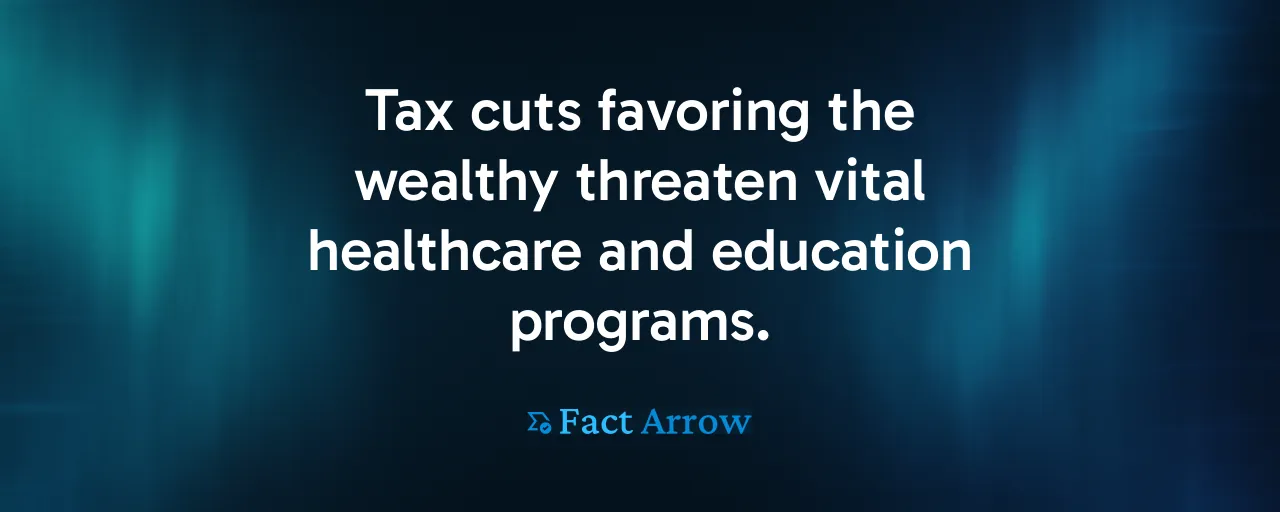A Bill That Divides
On July 3, 2025, House Republicans passed a sweeping tax-and-spending bill, dubbed by critics as a betrayal of working families. The 940-page measure, championed by President Trump, extends 2017 tax cuts, adds new deductions, and funds defense and immigration enforcement. Its steep cuts to Medicaid, food assistance, and clean-energy programs have, however, ignited fierce opposition. California Governor Gavin Newsom called it a 'moral failure,' warning of harm to healthcare and jobs.
This legislation arrives at a tense moment. With the federal debt-to-GDP ratio already above 108 percent, the bill adds $2.7 trillion to the deficit over a decade, per the Joint Committee on Taxation. While some celebrate tax relief, others see a dangerous tilt toward inequality. The debate centers on who benefits, who pays, and what it means for the nation's most vulnerable.
At its core, the bill raises a question of priorities. Should tax breaks for high earners take precedence over programs that feed children or fund hospitals? The answer, for many advocates, is clear: fairness demands a different approach, one that uplifts everyone, ensuring broad prosperity.
Wealth Over Well-Being
The bill's tax provisions heavily favor the affluent. According to the Urban-Brookings Tax Policy Center, 60 percent of its benefits go to the top 20 percent of earners. New deductions, like those for tips and overtime, offer some relief to workers, but the bulk of savings flow upward. The measure also slashes $28.4 billion in Medicaid funding for California alone, threatening coverage for 17 million people nationwide by 2034, per Kaiser Family Foundation projections.
These cuts hit hardest at families already stretched thin. Medicaid reductions could force rural hospitals to close, leaving communities without care. Food assistance for 3 million people is cut, risking hunger for children and seniors. The Guttmacher Institute warns that defunding Planned Parenthood endangers healthcare for 1.1 million patients, particularly in states where reproductive care is still legal.
Historical patterns echo this moment. The 1981 Kemp-Roth tax cuts also prioritized wealth, followed by safety-net debates that left gaps for the poor. Today's bill repeats that playbook, but advocates argue a different approach is needed. Tax policies, advocates contend, are most effective when they prioritize broad benefit, rather than concentrating wealth at the top.
Jobs and Climate at Risk
Beyond healthcare, the bill threatens economic and environmental progress. By repealing clean-energy tax credits from the Inflation Reduction Act, it puts 686,000 California jobs at risk, according to the North America's Building Trades Unions. These jobs, tied to solar, wind, and infrastructure, represent a growing sector that fights climate change while employing thousands.
The move also undermines global climate goals. With wildfires and extreme weather battering communities, slashing prevention programs and forest management funds is a step backward. Penalties on hybrid and electric vehicle owners further discourage sustainable choices, hitting families who've invested in a greener future.
Advocates for economic justice see a clear fix: preserve clean-energy incentives and tax the ultra-wealthy to fund them. Such policies would protect jobs, curb emissions, and ensure fairness. The bill's current path, they warn, sacrifices both people and the planet for short-term gains.
Safety and Justice Under Fire
Public safety also faces significant cuts. The bill cuts $646 million from FEMA's violence and terrorism prevention programs, $545 million from the FBI, and $468 million from the ATF. These reductions weaken efforts to combat gun violence and trafficking, leaving communities less secure. Cybersecurity funding drops by $491 million, exposing infrastructure to attacks.
Immigration enforcement, however, gets a boost, with billions for raids and detention. These policies target workers and families, including farmworkers and Dreamers, who contribute to society. Polls show most Americans favor a citizenship pathway for long-term residents, but the bill exacerbates division.
Community policing and job training could strengthen safety and inclusion, advocates argue. Redirecting funds from militarized enforcement to local solutions would rebuild trust and opportunity. The bill's cuts, by contrast, fray the social fabric.
Education and Opportunity Blocked
Students face new barriers under the bill. Limits on Pell Grants and financial aid restrict college access for millions. Ending student loan deferments for those facing job loss or hardship adds pressure, while barring future loan forgiveness programs locks in debt for borrowers. These changes widen inequality, hitting low-income and first-generation students hardest.
Education has long been a ladder to mobility. The 1996 welfare reform's cuts to support programs showed how slashing aid harms long-term outcomes, per a Princeton-Harvard study. Today's bill risks similar damage, closing doors to opportunity when they're needed most.
Investing in Pell Grants and loan relief would open those doors, advocates say. Pairing education with job training could empower a generation. Instead, the bill prioritizes tax breaks over the future, leaving young people to bear the cost.
A Call for Fairness
The bill's impacts, from healthcare to education, reveal a stark choice: prioritize wealth or equity. Its tax cuts add $2.7 trillion to the debt, but fail to fund hospitals, schools, or safety. Advocates for working families see a better way: tax high earners progressively, preserve safety nets, and invest in jobs and climate solutions.
History offers lessons. The 2010 Medicaid expansion under the Affordable Care Act lifted millions, showing what's possible when policy centers on people. Today, protecting those gains, while taxing the wealthiest to fund them, could rebuild trust and opportunity.
The fight isn't over. Policymakers, activists, and communities are rallying to demand a fairer system. They envision a nation where no one goes hungry, where healthcare is a right, and where opportunity reaches all. That vision, grounded in shared prosperity, is worth fighting for.
